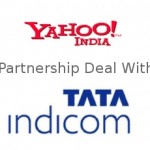 Redmond, Washington — The Redmond software company is gearing up to introduce a new search engine next week and is reportedly dropping its Japanese codename, “Kumo,” in favor of the brand name called “Bing”, possibily accompanied by a massive $80 to $100 million advertising campaign for Bing, in an attempt to help it seize a bigger slice of the online ad market that would not mention Google and Yahoo by name but will ask if you are happy with the results you get from competing services, according AdAge reports.
Redmond, Washington — The Redmond software company is gearing up to introduce a new search engine next week and is reportedly dropping its Japanese codename, “Kumo,” in favor of the brand name called “Bing”, possibily accompanied by a massive $80 to $100 million advertising campaign for Bing, in an attempt to help it seize a bigger slice of the online ad market that would not mention Google and Yahoo by name but will ask if you are happy with the results you get from competing services, according AdAge reports.
The search engine, up until now identified only as “Kumo,” but now the rebranded search service will be dubbed as “Bing,” which brings up an obvious question: will an ad campaign said to be upwards of $100 million ever get anybody to say “Just ‘Bing’ it?”

In order to promote the new search brand, Bing’s debut will feature a $80 to $100 million online, TV, print, and radio advertising campaign, according to Advertising Age. That is a huge campaign — huge incomparison with consumer-product launches ($50 million is considered a sizable budget for a national rollout). To put that number in perspective, Google’s total advertising budget for the year 2008 was about $25 million, according to TNS Media Intelligence, with about $11.6 million of that was allocated for recruiting.
Whereas, Microsoft, by comparison, spent $361 million. “Surely Google has never confronted an ad assault of this magnitude,” Abbey Klaassen reports for AdAge.
“JWT has been tapped for the push, which will include online, TV, print and radio. Another sign of the campaign’s size: At a time when most agencies are laying people off, JWT added creatives on the Microsoft business last week,” Klaassen reports.
Microsoft is expecting that a major ad push will take a chunk out of Google — the number one online search brand — in favor of Bing, the same way Microsoft’s laptop hunter ads helped in its fight against Apple.
The ad campaign will focus on boosting the new brand and challenge users to think if search really does work as well as they thought.
Google has about 65% of the search market share and Yahoo about 20%, while Microsoft stands at the single digits only. But the software heavyweigh believes there is plenty of room for improvement and in fact offers some internal data indicating 42 percent of all searches need to be refined after the first query.
“People familiar with the matter of the planned push said the ads would not go after Google, or Yahoo for that matter, by name. Instead, they will center on planting the idea that today’s search engines do not work as well as consumers previously thought by asking them whether search (aka Google) really solves their problems,” Klaassen reports. “That, Microsoft is hoping, will give consumers a reason to consider switching search engines, which, of course, is one of Bing’s biggest challenges.”
Shashi Seth, a former Google executive who is now chief revenue officer at Cooliris, “considers the Bing marketing challenge to that of the Apple iPhone before it was introduced. Most people, pre-iPhone, did not know they were missing a multi-touch screen, or an application that would enable them to detect what song was playing wherever they were. But Apple, through its ads, showed how markedly different the experience was and created a new de facto standard for phones,” Klaassen reports.
Microsoft’s anxiously awaited announcement, at this week’s prestigious All Things Digital conference, would follow by two weeks the hotly-anticipated launch of the Wolfram Alpha answer engine, which also touts itself as a niche-filler which provides factual answers to questions rather than providing links to source material which may contain the answer.
For a moment they may be right, but even with a killer search platform and an advertising campaign said to cost more tah $100 million, the Google brand has already become synonymous with Internet search; you can expect Microsoft to have a hard time changing that mindset.
Besides venturing to buy Yahoo and then attempting to do just a search deal with them Microsoft has tried mightily to increase Live Search share organically, with little success. Efforts even included paying users directly with a cashback search service, which gave rebates on purchases made through Live.com
Currently, Bing.com unblinkingly returns a page that only stares at you.


